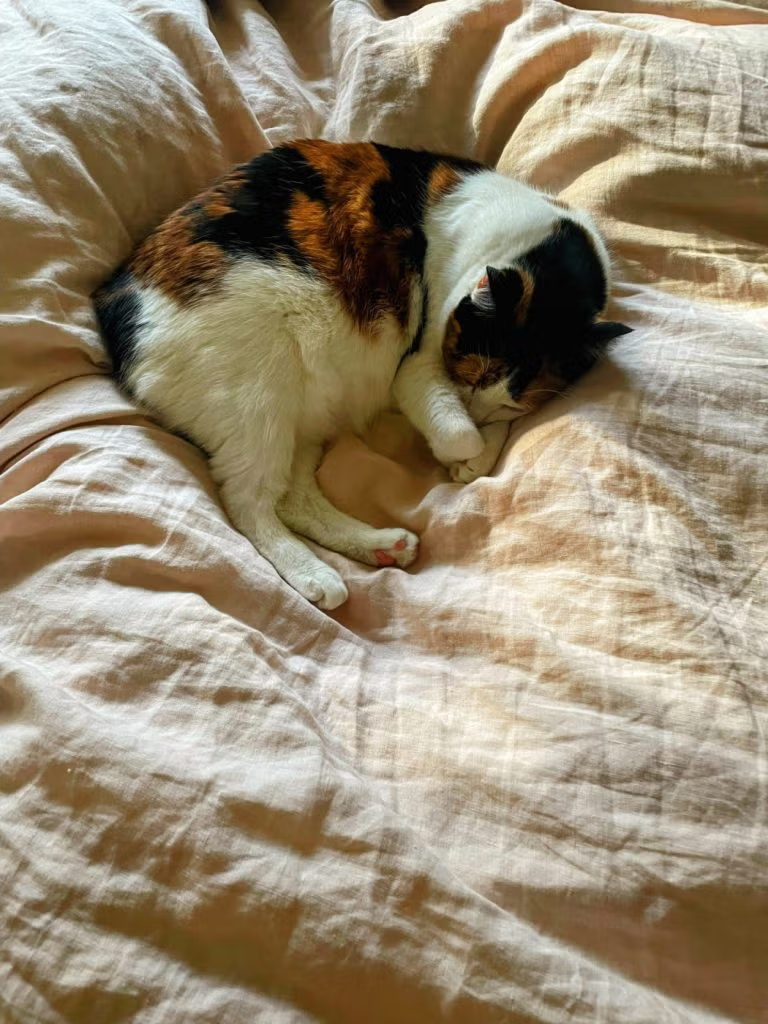Dear Reader,
When pleasure appears on the page, it is often simplified, sanitized, or centered on the experiences of straight cis men, while—off the page—pleasure is manifold: mundane, profound, individual, shared, sexual, platonic, messy, and moving.
In this issue, you will find pleasure distilled in the tip of a pen as it grazes skin, in a thumb wiping cum from a lover’s lips, and in a monosyllabic summons: Stay. You’ll find a sexy spin on B.F. Skinner’s experiment with pigeons and an essay about a skin bridge that forms between anus and clit, creating new possibilities for postpartum orgasms.
The poems, stories, essays, and erasures featured in this Mixtape span night-drawn city parks, high school hallways, ocean waters, forests, nurseries, and nursing homes. Here, there is intimacy in mess—a stew of squirrel bones, leaking urine—and intimacy in aloneness: rubbing one’s own labial folds, running slow through a new city, the decision to open a window. There is pleasure in the moments with a lover one wouldn’t think to capture: “weekday panties with loosening elastic” (Traci Brimhall, “My Lover’s Eyes Are Exactly Like the Sun”) or a come-hither whispered in the hallway—”I am ever so respectfully lusting after you”—half-intended to elicit a laugh (Catherine Simone Gray, “The Skin Bridge”).
Pleasure is sensory. In Luke Sutherland’s “My Octopus Wife,” you’ll feel the touch of a tentacle to your lips: “Only a dyke’s touch could devastate me like that.” You’ll taste the “small suns” of sliced nectarines in Marissa Davis’s “Then, Cathedral.” Finally, you’ll enter Lily Kaylor Honoré’s neon forest, where rough bark mingles with vintage perfume.

This issue draws inspiration from a panel I attended at AWP in March of 2022, titled “The Importance of Pleasure: Representations of Sex & the Body in Pleasure,” featuring Angie Dell, Jenny Irish, K-Ming Chang, and Jessica Q. Stark. The panel sought to address a longstanding gap, as articulated in the panel description: “Writing about the body experiencing sensual pleasure—especially female-identifying and queer bodies—is often outweighed by writing featuring the body-shamed and sexually traumatized… [There is] a comparative absence of pleasure on the page.”
As a poet and essayist who often attempts to write about pleasure, I left that panel thrumming with inspiration, but the feeling wasn’t entirely separable from the crush I was carrying around with me. I would return home to Michigan to find a note on my counter from my friend/cat-sitter, expressing their feelings for me. (It’s worth noting they also stocked my fridge.) “Slowness = pleasure,” I had written while listening to the panel. This became a model for the relationship I would soon find myself in—a relationship that deepens without urgency, a relationship that offers pleasure without scarcity.
I offer this issue to you as a mixtape warmed in a hot car, then pressed by a crush into your palm, played slowly and in sequence.
My deepest thanks to the team at MQR—Khaled Mattawa, Elinam Agbo, Aaron Stone, Dana Moss, and Chloe Alberta—for making this Mixtape possible. Thank you to the visual artists—Anastasia Duchess, Alex Romero, Caroline Harper New, Coriander Focus, and Leanne Dunic—whose photographs and paintings brought such beauty and synchronicity to this issue. And to Ian Burnette—happy anniversary.
I wish you pleasure,
Abigail McFee | Guest Editor
Abigail McFee is a Nebraska transplant and Zell Fellow at the University of Michigan, where she earned her MFA in Poetry and was the recipient of Hopwood Awards in Poetry and Nonfiction, a Theodore Roethke Prize for the Poetic Sequence, and a Meader Family Award for Graduate Poetry. You can find her on Instagram @abbymcfee and on Twitter @abigail_mcfee.

